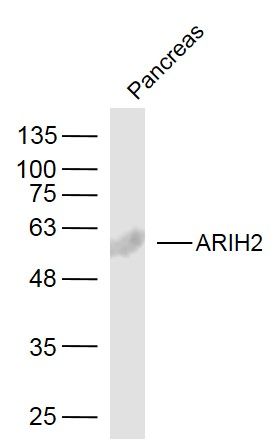ARIH2 Polyclonal Antibody
Purified Rabbit Polyclonal Antibody (Pab)
- SPECIFICATION
- CITATIONS
- PROTOCOLS
- BACKGROUND

Application
| WB, IHC-P, IHC-F, IF, ICC, E |
|---|---|
| Primary Accession | O95376 |
| Reactivity | Rat, Pig, Bovine |
| Host | Rabbit |
| Clonality | Polyclonal |
| Calculated MW | 58 KDa |
| Physical State | Liquid |
| Immunogen | KLH conjugated synthetic peptide derived from human ARIH2 |
| Epitope Specificity | 41-140/493 |
| Isotype | IgG |
| Purity | affinity purified by Protein A |
| Buffer | 0.01M TBS (pH7.4) with 1% BSA, 0.02% Proclin300 and 50% Glycerol. |
| SUBCELLULAR LOCATION | Nucleus. Cytoplasm. |
| SIMILARITY | Belongs to the RBR family. Ariadne subfamily. Contains 1 IBR-type zinc finger. Contains 2 RING-type zinc fingers. |
| SUBUNIT | Interacts (via RING-type 1) with UBE2L3. Interacts (via RING-type 2) with UBE2N. Interacts (via RING-type 2) with GFI1B. Interacts with GFI1; prevents its ubiquitination and proteasomal degradation. |
| Post-translational modifications | Ubiquitinated. Ubiquitination promotes proteasomal degradation. Phosphorylated upon DNA damage, probably by ATM or ATR. |
| Important Note | This product as supplied is intended for research use only, not for use in human, therapeutic or diagnostic applications. |
| Background Descriptions | TRIAD1, also known as ARIH2 (ariadne homolog 2) or ARI2, is a 493 amino acid protein that contains one IBR-type zinc finger and two RING-type zinc fingers and belongs to the ariadne subfamily of RBR proteins. Localized to the nucleus, TRIAD1 interacts with UBE2L3 and is thought to act as an E3 ubiquitin-protein ligase, functioning to accept ubiquitin from E2 ubiquitin-conjugating enzymes and transfer the acquired ubiquitin residue to target substrates. TRIAD1 is subject to post-translational DNA damage-dependent phosphorylation, probably by ATM or ATR. The gene encoding TRIAD1 maps to human chromosome 3, which houses over 1,100 genes, including a chemokine receptor (CKR) gene cluster and a variety of human cancer-related gene loci. |
| Gene ID | 10425 |
|---|---|
| Other Names | E3 ubiquitin-protein ligase ARIH2, ARI-2, Protein ariadne-2 homolog, 2.3.2.31, RING-type E3 ubiquitin transferase ARIH2, Triad1 protein, ARIH2, ARI2, TRIAD1 {ECO:0000303|PubMed:16118314} |
| Target/Specificity | Widely expressed with higher expression in granulocytes. |
| Dilution | WB=1:500-2000,IHC-P=1:100-500,IHC-F=1:100-500,ICC=1:100-500,IF=1:100-500,ELISA=1:5000-10000 |
| Storage | Store at -20 ℃ for one year. Avoid repeated freeze/thaw cycles. When reconstituted in sterile pH 7.4 0.01M PBS or diluent of antibody the antibody is stable for at least two weeks at 2-4 ℃. |
| Name | ARIH2 {ECO:0000303|PubMed:31253590, ECO:0000312|HGNC:HGNC:690} |
|---|---|
| Function | E3 ubiquitin-protein ligase, which catalyzes ubiquitination of target proteins together with ubiquitin-conjugating enzyme E2 UBE2L3 (PubMed:16118314, PubMed:17646546, PubMed:19340006, PubMed:24076655, PubMed:33268465, PubMed:34518685, PubMed:38418882). Acts as an atypical E3 ubiquitin-protein ligase by working together with cullin-5-RING ubiquitin ligase complex (ECS complex, also named CRL5 complex) and initiating ubiquitination of ECS substrates: associates with ECS complex and specifically mediates addition of the first ubiquitin on ECS targets (PubMed:33268465, PubMed:34518685, PubMed:38418882). The initial ubiquitin is then elongated (PubMed:33268465). E3 ubiquitin- protein ligase activity is activated upon binding to neddylated form of the cullin-5 (CUL5) component of the ECS complex (PubMed:24076655). Together with the ECS(ASB9) complex, catalyzes ubiquitination of CKB (PubMed:33268465). Promotes ubiquitination of DCUN1D1 (PubMed:30587576). Mediates 'Lys-6', 'Lys-48'- and 'Lys-63'-linked polyubiquitination (PubMed:16118314, PubMed:17646546, PubMed:19340006). May play a role in myelopoiesis (PubMed:19340006). |
| Cellular Location | Nucleus. Cytoplasm |
| Tissue Location | Widely expressed with higher expression in granulocytes. |

Thousands of laboratories across the world have published research that depended on the performance of antibodies from Abcepta to advance their research. Check out links to articles that cite our products in major peer-reviewed journals, organized by research category.
info@abcepta.com, and receive a free "I Love Antibodies" mug.
Provided below are standard protocols that you may find useful for product applications.
If you have used an Abcepta product and would like to share how it has performed, please click on the "Submit Review" button and provide the requested information. Our staff will examine and post your review and contact you if needed.
If you have any additional inquiries please email technical services at tech@abcepta.com.













 Foundational characteristics of cancer include proliferation, angiogenesis, migration, evasion of apoptosis, and cellular immortality. Find key markers for these cellular processes and antibodies to detect them.
Foundational characteristics of cancer include proliferation, angiogenesis, migration, evasion of apoptosis, and cellular immortality. Find key markers for these cellular processes and antibodies to detect them. The SUMOplot™ Analysis Program predicts and scores sumoylation sites in your protein. SUMOylation is a post-translational modification involved in various cellular processes, such as nuclear-cytosolic transport, transcriptional regulation, apoptosis, protein stability, response to stress, and progression through the cell cycle.
The SUMOplot™ Analysis Program predicts and scores sumoylation sites in your protein. SUMOylation is a post-translational modification involved in various cellular processes, such as nuclear-cytosolic transport, transcriptional regulation, apoptosis, protein stability, response to stress, and progression through the cell cycle. The Autophagy Receptor Motif Plotter predicts and scores autophagy receptor binding sites in your protein. Identifying proteins connected to this pathway is critical to understanding the role of autophagy in physiological as well as pathological processes such as development, differentiation, neurodegenerative diseases, stress, infection, and cancer.
The Autophagy Receptor Motif Plotter predicts and scores autophagy receptor binding sites in your protein. Identifying proteins connected to this pathway is critical to understanding the role of autophagy in physiological as well as pathological processes such as development, differentiation, neurodegenerative diseases, stress, infection, and cancer.


